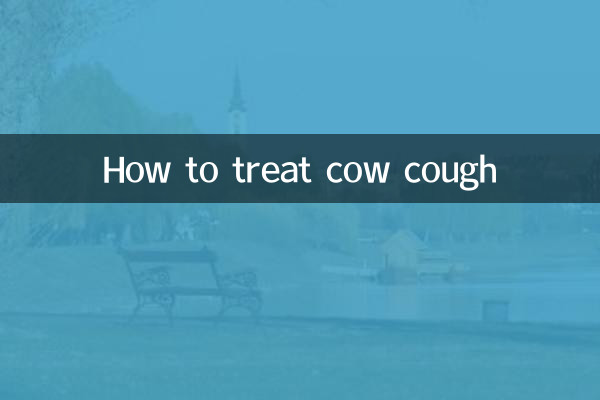How to treat cow cough
Recently, the problem of cattle cough has become a hot topic in the breeding industry, and many farmers and veterinary experts have discussed its causes and treatments. This article will combine the hot content from the entire Internet in the past 10 days to provide you with structured data and analysis to help you better deal with the problem of cow cough.
1. Common causes of cough in cattle

Cough in cattle is often caused by a variety of factors, including environmental, pathogenic and nutritional issues. The following are some of the major causes that have been discussed more recently:
| Cause | Proportion (discussion popularity in the past 10 days) | Typical symptoms |
|---|---|---|
| Respiratory tract infections (bacterial/viral) | 45% | Cough, runny nose, fever |
| Environmental factors (dust, ammonia) | 30% | Dry cough, shortness of breath |
| parasitic infection | 15% | intermittent cough, weight loss |
| Nutrient deficiencies (such as vitamin A) | 10% | Cough accompanied by weakened immunity |
2. Treatment methods for cow cough
According to the recent practical experience of veterinary experts and farmers, the treatment of cattle cough requires appropriate medicine. The following are common treatment options:
| Treatment | Applicable situations | Recommended drugs/measures |
|---|---|---|
| antibiotic treatment | bacterial respiratory tract infection | Penicillin, Oxytetracycline |
| antiviral drugs | viral infection | Interferon, Ribavirin |
| anthelmintic treatment | parasitic infection | Ivermectin, albendazole |
| environmental improvement | Dust or ammonia irritation | Improve ventilation and reduce litter dust |
| Nutritional supplements | vitamin deficiency | Vitamin A and D injection or feed supplementation |
3. Key measures to prevent cattle cough
Prevention is better than cure, the following are the preventive measures that have been hotly discussed recently:
1.Regular disinfection: Cattle sheds should be disinfected 1-2 times a week to reduce the growth of pathogens.
2.Vaccination: Vaccination against common respiratory diseases such as infectious bovine rhinotracheitis.
3.Reasonable grouping: Avoid overcrowding and reduce the risk of disease transmission.
4.feed management: Ensure feed nutrition is balanced and supplement vitamins and minerals.
4. Recent popular questions and answers
According to online discussions in the past 10 days, the following are the two issues that farmers are most concerned about:
Q1: Can cow cough be transmitted to other cows?
A: If it is a bacterial or viral infection, the cough may be spread through droplets, and the sick cow needs to be isolated in time.
Q2: Is traditional Chinese medicine effective in treating cow cough?
A: Recently, some farmers shared that Chinese medicines such as isatis root and ephedra decoction have certain effects on mild coughs, but severe cases still need to be treated with Western medicine.
5. Summary
The prevention and treatment of cattle cough requires a comprehensive judgment of the cause and the adoption of targeted measures. It can be seen from recent hot data that environmental management and vaccination are the keys to prevention, while antibiotics and antiviral drugs are the main means of treatment. Farmers should pay close attention to the health of their cattle and consult veterinary experts in a timely manner.
I hope the structured data and hot spot analysis in this article can provide you with a practical reference!

check the details

check the details